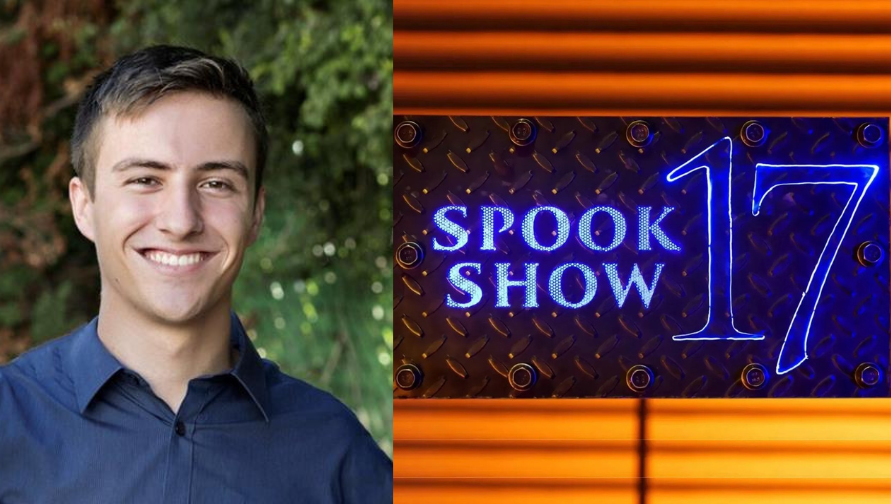
Anthony Kalmeta is a Film and Media Studies alumni who recently worked as an editor on Spook Show 17. Spook Show 17 is a television series that follows an egotistical innovator, Robbie Luther, and his business-savvy wife, Heather, and their journey as they create their own reality TV show about putting together the craziest haunted house in the galaxy, The 17th Door. Over the course of 14 episodes, we witness Robbie and Heather design, build, and operate The 17th Door along with the misfit crew they assembled. Spook Show 17 premiered in October 2022 and is now available on multiple online platforms such as Amazon Prime and Tubi.
- What was it like being an editor of a television show? Can you describe your role/duties?
- “It was a big learning experience to edit Spook Show 17, not only were there ungodly amounts of raw footage (thousands of hours: petabytes worth) but when we started there was no clear episodic structure or thematic through-line. Wyatt Barclay led and spearheaded the entire creative process alongside the show creator Robbie Luther. I worked very closely with them as the main editor - we also had about 5 assistant editors on the team. The biggest challenge was analyzing the footage to see what was usable, what storylines could be created if those storylines connected, and how ideas would flow between scenes. After countless rough cuts, trial and error, we started to realize the limitations of our footage and the secret sauce to every good TV show: a feeling of progression (moving towards a clear goal) and narrative coherence. Initially, we meandered through each episode, touched on funny moments, and crafted cool montages, but nothing ever felt significant or connected. We had to completely rethink our approach. Each episode took extreme creative ingenuity to create. This included fabricating lines and entire scenes out of thin air, especially when microphones missed important information or the cameras cut off too early. I also had to edit footage in non-linear ways to give the illusion of a complete scene, which meant there were a lot of repurposed shots and merging disconnected events into one. There was even a physical wall dedicated to reworking these segments, written on notecards, that could be switched around freely as a sort of makeshift episode roadmap. In addition to story editing, my duties also included some VFX work; there are a lot of moments in the show where we zoom out from locations on a blueprint map into the next scene, storyboards that highlight key moments, or funny visual graphics.”
- What was the most challenging/rewarding part of the project?
- “ The most challenging part of the project was understanding when something didn't work. We'd cut a segment down and place it in the episode and think, "yeah, that works and it subtly sets up this other idea that's in the later episode". We didn't realize that we overanalyzed the footage so much we couldn't see it objectively anymore. Disconnected story threads seemed coherent and entertaining on repeat viewings, but they were, in reality, flimsy at best. The scenes would also move so fast that any form of subtle direction was incomprehensible. We realized viewers don't have the time to absorb anything that isn't clearly communicated - causing confusion as to why a segment even exists in the first place. Our test audience confirmed this, subtlety was a trap, and we ultimately built out easy-to-understand guidelines and rules to keep the audience mentally flowing with the purpose and direction of each scene (relating it to the show's larger context). The most rewarding part was when we finally accomplished that! Things started to finally click in place, like puzzle pieces, and the show felt like a well-developed product that's ready to be watched, especially on its current home platforms Amazon Prime and Tubi.”
- How did your time at FMS prepare you for a job working in the industry?
- “ My time at FMS taught me how to critically think with others and grow my skills based on outside input. It's probably the most important skill you can learn and my classmates helped critique and inform me when something didn't flow idea-wise. Believe it or not, writing essays not only helps to organize thoughts, but it forces you to think about the audience (the reader) and what information is important to keep, delete, or re-work.”
- Do you have any advice for current FMS students who want to work in the industry?
- “My biggest piece of advice is to find your network of creatives and listen to them. Take risks, meet classmates, and strengthen your communication skills. You'll be well-rounded and have a reliable support network for future projects.”
